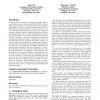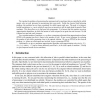19 search results - page 2 / 4 » Miscomputing ratio: social cost of selfish computing |
ATAL
2008
Springer
13 years 8 months ago
2008
Springer
In this paper, we investigate multi-agent learning (MAL) in a multi-agent resource selection problem (MARS) in which a large group of agents are competing for common resources. Si...
TCS
2010
13 years 22 days ago
2010
We consider the problem of maximizing the minimum load for machines that are controlled by selfish agents, who are only interested in maximizing their own profit. Unlike the class...
STOC
2002
ACM
14 years 6 months ago
2002
ACM
We study the degradation in network performance caused by the selfish behavior of noncooperative network users. We consider a model of selfish routing in which the latency experie...
CORR
2006
Springer
13 years 6 months ago
2006
Springer
In set-system auctions, there are several overlapping teams of agents, and a task that can be completed by any of these teams. The auctioneer's goal is to hire a team and pay...
ATAL
2010
Springer
13 years 7 months ago
2010
Springer
We consider the problem of allocating networked resources in dynamic environment, such as cloud computing platforms, where providers strategically price resources to maximize thei...


